The Inflammatory Diseases Market is estimated to be valued at USD 22.5 billion in 2025 and is projected to reach USD 34.9 billion by 2035, registering a compound annual growth rate (CAGR) of 4.5% over the forecast period.
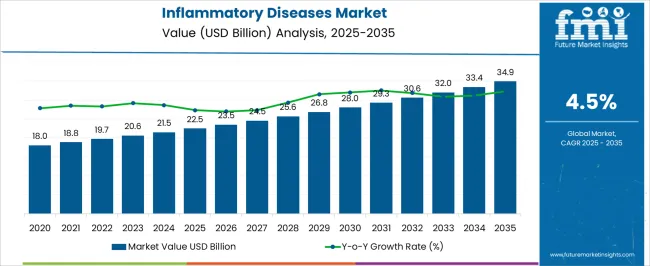
| Metric | Value |
|---|---|
| Inflammatory Diseases Market Estimated Value in (2025 E) | USD 22.5 billion |
| Inflammatory Diseases Market Forecast Value in (2035 F) | USD 34.9 billion |
| Forecast CAGR (2025 to 2035) | 4.5% |
The Inflammatory Diseases market is experiencing strong growth, supported by the increasing global prevalence of chronic inflammatory conditions such as asthma, arthritis, inflammatory bowel disease, and psoriasis. Rising awareness of these diseases, coupled with advances in diagnostic tools, is leading to earlier detection and timely treatment adoption. Lifestyle factors, pollution, and an aging population are further contributing to the higher incidence of inflammatory disorders worldwide.
Pharmaceutical companies are investing in research and development of biologics, targeted therapies, and personalized medicine approaches to improve treatment outcomes and reduce side effects associated with conventional drugs. Governments and healthcare organizations are also focusing on improving patient access to advanced therapies through reimbursement initiatives and healthcare infrastructure development.
Continuous innovation in biologics and the expansion of biosimilars are driving affordability and wider adoption across regions As the demand for effective therapies that address both symptoms and underlying causes rises, the Inflammatory Diseases market is expected to continue on a steady growth trajectory, supported by medical innovation and evolving patient needs.
The inflammatory diseases market is segmented by type of diseases, type of drug class, type of distribution channel, and geographic regions. By type of diseases, inflammatory diseases market is divided into Asthma, Chronic Obstructive Pulmonary Disease, Heart Disease, Multiple Sclerosis, Psoriasis, Inflammatory Bowel Disease, Bone Disease, Rheumatoid Arthritis, Osteoarthritis, Others, and Respiratory Diseases. In terms of type of drug class, inflammatory diseases market is classified into Anti-Inflammatory Biologics, Non-Steroidal Anti-Inflammatory Drugs, Corticosteroids, and Others. Based on type of distribution channel, inflammatory diseases market is segmented into Hospital Pharmacy, Retail Pharmacy, Drug Stores, and Online Pharmacy. Regionally, the inflammatory diseases industry is classified into North America, Latin America, Western Europe, Eastern Europe, Balkan & Baltic Countries, Russia & Belarus, Central Asia, East Asia, South Asia & Pacific, and the Middle East & Africa.
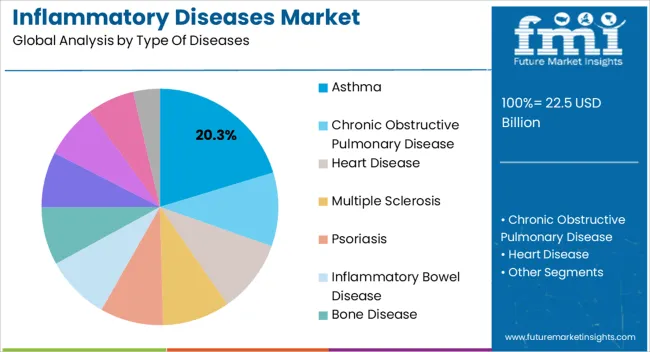
The asthma segment is projected to account for 20.3% of the Inflammatory Diseases market revenue in 2025, making it one of the leading disease types. This prominence is being supported by the increasing global burden of asthma, which is rising due to factors such as pollution, urbanization, and genetic predisposition. Asthma management requires long-term treatment, and advances in inhalation therapies, biologics, and patient monitoring devices are improving patient outcomes.
Awareness campaigns and public health initiatives aimed at reducing asthma-related complications are also encouraging higher diagnosis and treatment rates. The availability of specialized therapies tailored to specific patient needs, such as biologics for severe asthma, is further driving growth in this segment.
Additionally, digital health solutions such as mobile applications for asthma tracking and connected inhaler technologies are enhancing patient adherence and monitoring As the incidence of asthma continues to increase globally, coupled with innovations in treatment methods and broader access to advanced therapies, the segment is expected to maintain a significant role in driving market growth.
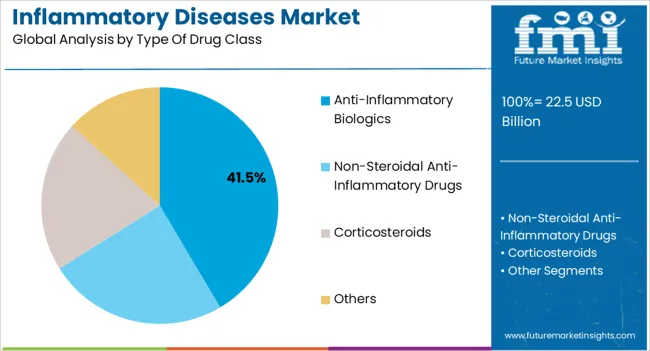
The anti-inflammatory biologics segment is anticipated to hold 41.5% of the market revenue in 2025, positioning it as the dominant drug class. Biologics have become the preferred treatment option due to their targeted mechanisms of action, which address the underlying causes of inflammation rather than just alleviating symptoms. Their success in treating complex conditions such as rheumatoid arthritis, Crohn’s disease, ulcerative colitis, and severe asthma has solidified their role in therapeutic regimens.
The expansion of biosimilars is also making these treatments more accessible and cost-effective, further driving adoption. Continuous research into next-generation biologics and the development of personalized therapies tailored to genetic and biomarker profiles are enhancing treatment efficacy and patient outcomes.
Physicians increasingly prefer biologics for patients with severe or treatment-resistant conditions, which is contributing to segment leadership As healthcare systems focus on improving access to advanced therapies and pharmaceutical companies accelerate innovation pipelines, anti-inflammatory biologics are expected to remain a key driver of growth in the Inflammatory Diseases market.
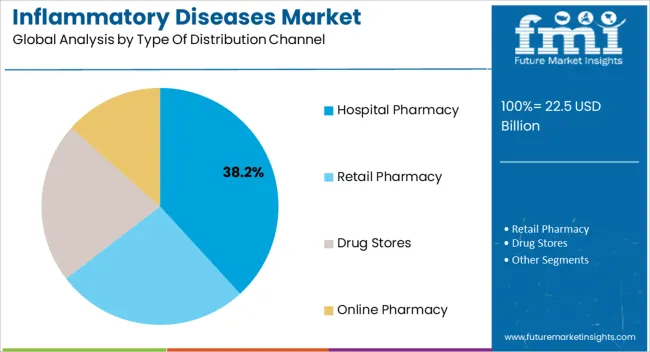
The hospital pharmacy segment is projected to account for 38.2% of the Inflammatory Diseases market revenue in 2025, making it the leading distribution channel. This dominance is attributed to the fact that a large proportion of biologics and advanced therapies are administered in hospital settings under physician supervision. Hospital pharmacies provide controlled environments for handling complex drug formulations, ensuring proper storage and distribution in compliance with safety regulations.
Patients with severe inflammatory diseases often require hospital-based treatments and infusions, reinforcing the channel’s importance. Hospital pharmacies also play a crucial role in enabling access to clinical trial drugs and newly launched therapies, particularly in tertiary care centers and specialized treatment facilities. Their integration with electronic medical record systems and centralized healthcare networks enhances medication tracking and regulatory compliance.
Additionally, hospital-based pharmacists support patient education, dosage monitoring, and side-effect management, improving treatment adherence As demand for biologics and infusion-based therapies continues to grow, hospital pharmacies are expected to maintain their leadership as the most reliable and trusted distribution channel in the market.
A new understanding of inflammatory diseases has changed the drug development landscape for several major diseases that are affecting millions of people in the world. Inflammation describes the primary response of the body that eliminates the cause of injury. Periodically, body’s defense mechanism works inappropriately that leads to inflammation.
Drug development has focused on treating each disease symptoms separately. The discovery of drugs to treat inflammatory diseases related with immune system is driving the market towards growth.
Immune Mediated Inflammatory diseases represent a global threat in terms of quality of life, morbidity and mortality that leads to increasing opportunity to develop new treatments to conquer the inflammatory diseases and increase market share. On the top inflammatory diseases are most common in human beings. Increasing popularity of inflammatory diseases and treatment followed by anti-inflammatory drugs with lesser side effects is driving the global inflammatory diseases market.
On the basis of type of disease global inflammatory diseases market is segmented into respiratory diseases, heart disease, multiple sclerosis, Psoriasis, inflammatory bowel disease, bone disease and others.
Respiratory diseases are further classified into asthma and chronic obstructive pulmonary disease, where asthma is a condition in that a person’s airways become swollen, narrow and inflamed to produce extra mucus and chronic obstructive pulmonary disease (COPD) is name for a group of lung conditions that causes due to smoking in adults that leads to breathing difficulties.
Heart disease or heart disorders are conditions in that heart stops functioning, there are several types of heart diseases like arrhythmias heart disease, atherosclerotic and cardiomyopathy. Multiple sclerosis is a degenerative disease that attack central nervous system and disrupts the flow of information within the brain.
Psoriasis is systemic inflammation that causes red and flaky plaques with joint pain of psoriatic arthritis. Inflammatory bowel disease involves inflammation related with gastro intestinal tract, includes to most common diseases of gastro intestinal tract that are crohn’s disease and ulcerative disease. Bone disease mostly includes rheumatoid arthritis and osteoarthritis.
Moreover, on the basis of drug class used in treatment of inflammatory diseases global inflammatory diseases market is segmented into non-steroidal anti-inflammatory drugs, anti-inflammatory biologics and corticosteroids. Non-steroidal anti-inflammatory drugs bound the production of hormones in the body such as prostaglandins that is responsible for inflammation.
Anti-inflammatory biologics are mostly used in treatment of arthritis indications in rheumatoid arthritis and osteoarthritis that is one of the revenue generating segment followed by respiratory diseases like asthma and chronic obstructive pulmonary disease. On the basis of distribution channel global inflammatory disease market is segmented into hospital pharmacy, retail pharmacy, drug stores and online pharmacy.
Geographically, global inflammatory market is segmented into five key regions: North America, Latin America, Europe, Asia Pacific and Middle East Africa. North Amrica is dominating in inflammatory diseases market as there is demand for branded medicines over the generic medicines.
Rising geriatric population is driving the inflammatory diseases market throughout the globe. Followed by North America, Asia Pacific and Latin America has shown increasing market share in inflammatory diseases.
Some of the major players in global inflammatory diseases market are AstraZeneca, Merck & Co., GlaxoSmithKline, Bristol-Myers Squibb, F-Hoffmann-La-Roche, Eli Lilly and Sanofi.
Other emerging competitors like Enlivex Therapeutics Ltd., Gilead Sciences, Immune Pharmaceuticals, Merck, Mitsubishi Tanabe Pharma Corporation, Neovacs, Prometheus Laboratories, Sandoz, and Takeda Pharmaceuticals are developing drug pipeline and launch of new products as key strategies.
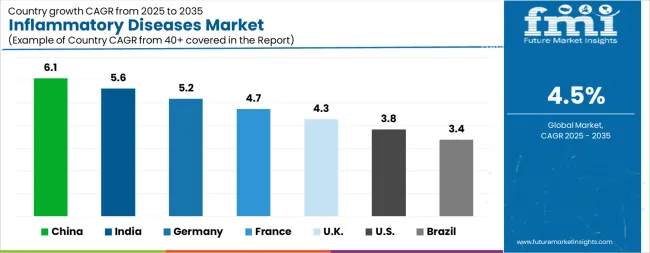
| Country | CAGR |
|---|---|
| China | 6.1% |
| India | 5.6% |
| Germany | 5.2% |
| France | 4.7% |
| UK | 4.3% |
| USA | 3.8% |
| Brazil | 3.4% |
The Inflammatory Diseases Market is expected to register a CAGR of 4.5% during the forecast period, exhibiting varied country level momentum. China leads with the highest CAGR of 6.1%, followed by India at 5.6%. Developed markets such as Germany, France, and the UK continue to expand steadily, while the USA is likely to grow at consistent rates. Brazil posts the lowest CAGR at 3.4%, yet still underscores a broadly positive trajectory for the global Inflammatory Diseases Market. In 2024, Germany held a dominant revenue in the Western Europe market and is expected to grow with a CAGR of 5.2%. The USA Inflammatory Diseases Market is estimated to be valued at USD 8.4 billion in 2025 and is anticipated to reach a valuation of USD 12.2 billion by 2035. Sales are projected to rise at a CAGR of 3.8% over the forecast period between 2025 and 2035. While Japan and South Korea markets are estimated to be valued at USD 1.0 billion and USD 648.6 million respectively in 2025.
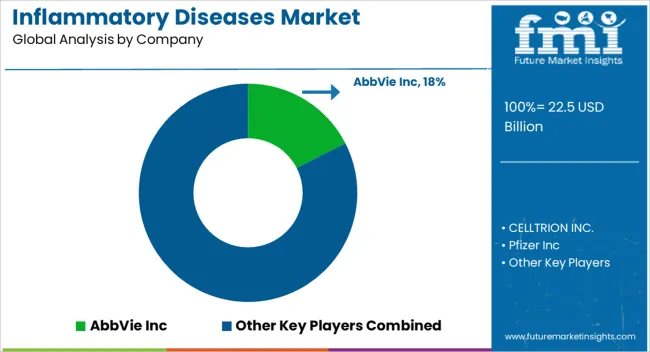
| Item | Value |
|---|---|
| Quantitative Units | USD 22.5 Billion |
| Type Of Diseases | Asthma, Chronic Obstructive Pulmonary Disease, Heart Disease, Multiple Sclerosis, Psoriasis, Inflammatory Bowel Disease, Bone Disease, Rheumatoid Arthritis, Osteoarthritis, Others, and Respiratory Diseases |
| Type Of Drug Class | Anti-Inflammatory Biologics, Non-Steroidal Anti-Inflammatory Drugs, Corticosteroids, and Others |
| Type Of Distribution Channel | Hospital Pharmacy, Retail Pharmacy, Drug Stores, and Online Pharmacy |
| Regions Covered | North America, Europe, Asia-Pacific, Latin America, Middle East & Africa |
| Country Covered | United States, Canada, Germany, France, United Kingdom, China, Japan, India, Brazil, South Africa |
| Key Companies Profiled | AbbVie Inc, CELLTRION INC., Pfizer Inc, Biogen, Novartis AG, Lilly, UCB S.A., Takeda Pharmaceutical Company Limited, Merck & Co., Inc., and Johnson & Johnson Services, Inc |
The global inflammatory diseases market is estimated to be valued at USD 22.5 billion in 2025.
The market size for the inflammatory diseases market is projected to reach USD 34.9 billion by 2035.
The inflammatory diseases market is expected to grow at a 4.5% CAGR between 2025 and 2035.
The key product types in inflammatory diseases market are asthma, chronic obstructive pulmonary disease, heart disease, multiple sclerosis, psoriasis, inflammatory bowel disease, bone disease, rheumatoid arthritis, osteoarthritis, others and respiratory diseases.
In terms of type of drug class, anti-inflammatory biologics segment to command 41.5% share in the inflammatory diseases market in 2025.
Explore Similar Insights

Thank you!
You will receive an email from our Business Development Manager. Please be sure to check your SPAM/JUNK folder too.
Chat With
MaRIA